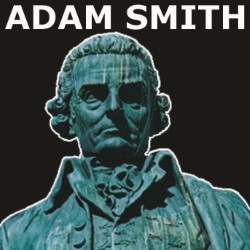Adam Smith is undoubtedly most famous for his seminal work The Wealth of Nations, widely regarded as one of the most influential texts in modern economics. As a result, Smith has often been tarred with the tainted brush of creating the playbook for capitalism. This new play from theatre company Kirkcaldy4All attempts to vindicate the man and highlight the philanthropic qualities which have often been overshadowed by the ultimate fruits of his labour.
The play is appropriately housed in the recently opened Panmure House, Adam Smith’s home for the last 11 years of his life. Prior to its commencement, the audience members are gathered in a lobby containing touch screens and informational panels which give more background on the man in question. The play itself is located two floors up in a modified thrust theatre stage, mocked up to resemble Smith’s drawing room and various other locations. In this cosy setting, we’re taken on a whirlwind tour of Smith’s life and times, framed by the modern-day depiction of the discovery of a treasure trove of lost letters and pamphlets.
The four actors portray a number of different roles, with writer and director John Yule acting as Smith in an admirably understated performance. Susan Coyle also impresses as his overbearing mother and Helen McKenzie, the avaricious homeowner who discovers Smith’s letters in the loft of her new house, but gradually (and a touch unconvincingly) has her eyes opened to the error of her ways through learning more about the man’s beliefs. Simon Macallum thunders through his roles as the Professor keen to publish the newly-found letters and the narrator, while Martin Docherty overstretches himself slightly in five very different roles – Smith’s trusted right-hand-man John, his close friend David Hume and other contemporaries Voltaire, Jean-Jacques Rousseau and Robert Burns.
While all four actors are guilty of swallowing or stumbling through their lines at different times, for the majority of the 75-minute show they acquit themselves well and bring the necessary gravitas to the performance. Despite their best efforts, however, the play does suffer in terms of momentum from its subject matter; as something in between an account of Smith’s largely uneventful life and an apology for his unwanted legacy, it lacks impetus. The insinuation of a love interest between McKenzie and the Professor appears to be an attempt at plugging this gap, albeit a failed one.
As a result, the play trundles along somewhat and the constant skipping back-and-forth across geographical locations and historical periods does not help to spark it into life. Those with an interest in the subject matter may well leave the theatre with an improved knowledge of Smith’s biography and an enhanced appreciation for his moral qualities, but the impression that either makes on them is unlikely to be all that great.
